
Victor Marie Hugo; 26 February 1802 - 22 May 1885) was a French poet, novelist, and dramatist of the Romantic movement. Hugo is considered to be one of the greatest and best-known French writers. Outside of France, his most famous works are the novels Les Misérables, 1862, and The Hunchback of Notre-Dame (French: Notre-Dame de Paris), 1831. In France, Hugo is known primarily for his poetry collections, such as Les Contemplations (The Contemplations) and La Légende des siècles (The Legend of the Ages).
Hugo was at the forefront of the romantic literary movement with his plays Cromwell and Hernani. Many of his works have inspired music, both during his lifetime and after his death, including the musicals Notre-Dame de Paris and Les Misérables. He produced more than 4,000 drawings in his lifetime, and campaigned for social causes such as the abolition of capital punishment.
Though a committed royalist when he was young, Hugo's views changed as the decades passed, and he became a passionate supporter of republicanism; his work touches upon most of the political and social issues and the artistic trends of his time. He is buried in the Panthéon in Paris. His legacy has been honoured in many ways, including his portrait being placed on French currency.
Personal life
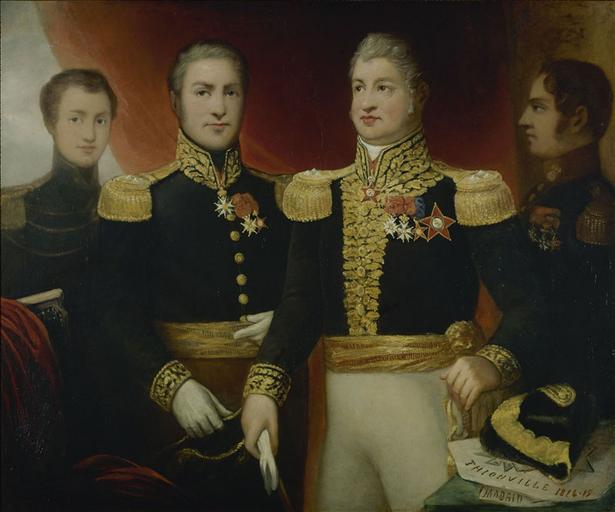 |
| Joseph Hugo and his sons |
Victor Hugo was the third son of Joseph Léopold Sigisbert Hugo (1774-1828) and Sophie Trébuchet (1772-1821); his brothers were Abel Joseph Hugo (1798-1855) and Eugène Hugo (1800-1837). He was born in 1802 in Besançon in the eastern region of Franche-Comté. On 19 November 1821, Léopold Hugo wrote to his son that he had been conceived on one of the highest peaks in the Vosges Mountains, on a journey from Lunéville to Besançon. " This elevated origin, he went on, seems to have had effects on you so that your muse is now continually sublime." Léopold Hugo was a freethinking republican who considered Napoleon a hero; by contrast, Sophie Hugo was a Catholic Royalist who was intimately involved with her possible lover General Victor Lahorie, who was executed in 1812 for plotting against Napoleon.
 |
| Hugo maternal grandmother Renée-Louise Trébuchet |
Hugo's childhood was a period of national political turmoil. Napoleon was proclaimed Emperor of the French two years after Hugo's birth, and the Bourbon Monarchy was restored before his 13th birthday. The opposing political and religious views of Hugo's parents reflected the forces that would battle for supremacy in France throughout his life: Hugo's father was a high-ranking officer in Napoleon's army until he failed in Spain (one of the reasons why his name is not present on the Arc de Triomphe).
Since Hugo's father was an officer, the family moved frequently and Hugo learned much from these travels. On a childhood family trip to Naples, Hugo saw the vast Alpine passes and the snowy peaks, the magnificently blue Mediterranean, and Rome during its festivities. Though he was only five years old at the time, he remembered the six-month-long trip vividly. They stayed in Naples for a few months and then headed back to Paris.
 |
Hugo maternal grandfather Jean-François Trébuchet |
At the beginning of her marriage, Hugo's mother Sophie followed her husband to posts in Italy (where Léopold served as a governor of a province near Naples) and Spain (where he took charge of three Spanish provinces). Weary of the constant moving required by military life, and at odds with her husband's lack of Catholic beliefs, Sophie separated temporarily from Léopold in 1803 and settled in Paris with her children. Thereafter she dominated Hugo's education and upbringing. As a result, Hugo's early work in poetry and fiction reflect her passionate devotion to both King and Faith. It was only later, during the events leading up to France's 1848 Revolution, that he would begin to rebel against his Catholic Royalist education and instead champion Republicanism and Freethought.
Young Victor fell in love with and became secretly engaged to his childhood friend Adèle Foucher (1803–1868), against his mother's wishes. Because of his close relationship with his mother, Hugo waited until after her death (in 1821) to marry Adèle in 1822.
Adèle and Victor Hugo had their first child, Léopold, in 1823, but the boy died in infancy. On 28 August 1824, the couple's second child, Léopoldine was born, followed by Charles on 4 November 1826, François-Victor on 28 October 1828, and Adèle (Musician) on 24 August 1830.
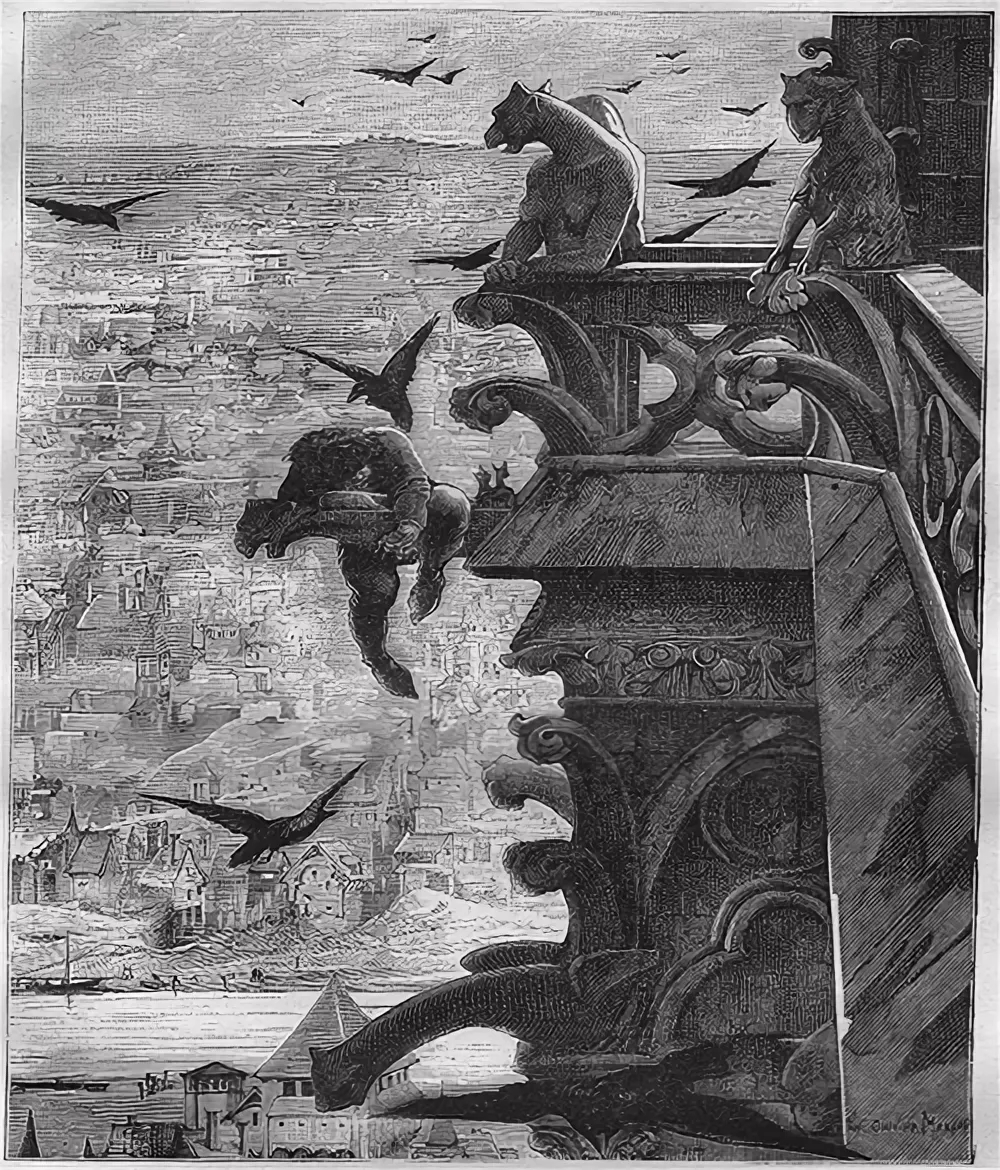 |
| Illustration by Luc-Olivier Merson for Notre-Dame de Paris (1881), showing the recently restored galerie des chimères. |
Hugo's eldest and favourite daughter, Léopoldine, died aged 19 in 1843, shortly after her marriage to Charles Vacquerie. On 4 September, she drowned in the Seine at Villequier, pulled down by her heavy skirts when a boat overturned. Her young husband also died trying to save her. The death left her father devastated; Hugo was travelling with his mistress at the time in the south of France, and first learned about Léopoldine's death from a newspaper he read in a café.
Writings
 |
| Victor Hugo in 1853 |
Hugo published his first novel the year following his marriage (Han d'Islande, 1823), and his second three years later (Bug-Jargal, 1826). Between 1829 and 1840, he published five more volumes of poetry (Les Orientales, 1829; Les Feuilles d'automne, 1831; Les Chants du crépuscule, 1835; Les Voix intérieures, 1837; and Les Rayons et les Ombres, 1840), cementing his reputation as one of the greatest elegiac and lyric poets of his time.
Like many young writers of his generation, Hugo was profoundly influenced by François-René de Chateaubriand, the famous figure in the literary movement of Romanticism and France's pre-eminent literary figure during the early 19th century. In his youth, Hugo resolved to be "Chateaubriand or nothing", and his life would come to parallel that of his predecessor in many ways. Like Chateaubriand, Hugo furthered the cause of Romanticism, became involved in politics (though mostly as a champion of Republicanism), and was forced into exile due to his political stances.
The precocious passion and eloquence of Hugo's early work brought success and fame at an early age. His first collection of poetry (Odes et poésies diverses) was published in 1822 when he was only 20 years old and earned him a royal pension from Louis XVIII. Though the poems were admired for their spontaneous fervour and fluency, the collection that followed four years later in 1826 (Odes et Ballades) revealed Hugo to be a great poet, a natural master of lyric and creative song.
Victor Hugo's first mature work of fiction was first published in February 1829 by Charles Gosselin without the author's name and reflected the acute social conscience that would infuse his later work. Le Dernier jour d'un condamné (The Last Day of a Condemned Man) would have a profound influence on later writers such as Albert Camus, Charles Dickens, and Fyodor Dostoyevsky. Claude Gueux, a documentary short story about a real-life murderer who had been executed in France. On 15 March 1832, Hugo completed this story with a long preface and his signature which was later considered by Hugo himself to be a precursor to his great work on social injustice, Les Misérables.
Hugo became the figurehead of the romantic literary movement with the plays Cromwell (1827) and Hernani (1830).
Hugo's novel Notre-Dame de Paris (The Hunchback of Notre-Dame) was published in 1831 and quickly translated into other languages across Europe. One of the effects of the novel was to shame the City of Paris into restoring the much-neglected Cathedral of Notre Dame, which was attracting thousands of tourists who had read the popular novel. The book also inspired a renewed appreciation for pre-Renaissance buildings, which thereafter began to be actively preserved.
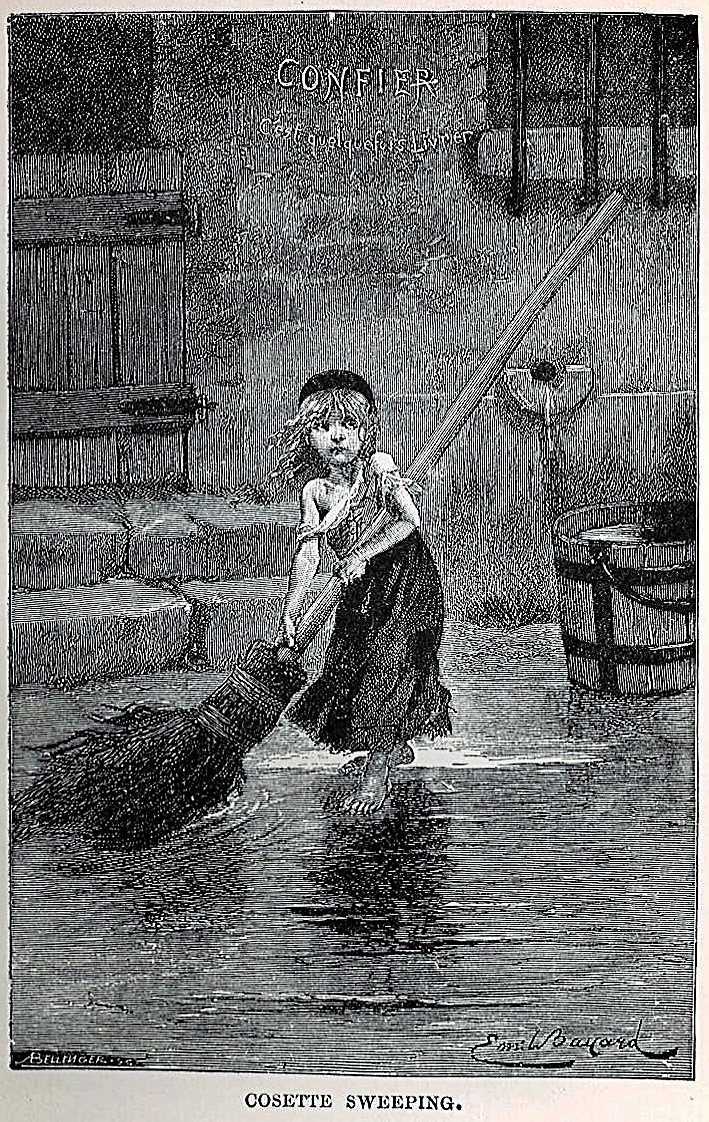 |
| Portrait of "Cosette" by Émile Bayard, from the original edition of Les Misérables (1862) |
Hugo began planning a major novel about social misery and injustice as early as the 1830s, but a full 17 years were needed for Les Misérables to be realised and finally published in 1862. Hugo had used the departure of prisoners for the Bagne of Toulon in one of his early stories, "Le Dernier Jour d'un condamné" He went to Toulon to visit the Bagne in 1839 and took extensive notes, though he did not start writing the book until 1845. On one of the pages of his notes about the prison, he wrote in large block letters a possible name for his hero: " JEAN TRÉJEAN". When the book was finally written, Tréjean became Jean Valjean.
Hugo was acutely aware of the quality of the novel, as evidenced in a letter he wrote to his publisher, Albert Lacroix, on 23 March 1862, "My conviction is that this book is going to be one of the peaks, if not the crowning point of my work." So publication of the Miserables went to the highest bidder. The Belgian publishing house Lacroix and Verboeckhoven undertook a marketing campaign unusual for the time, issuing press releases about the work a full six months before the launch. It also initially published only the first part of the novel ("Fantine"), which was launched simultaneously in major cities. Instalments of the book sold out within hours and had enormous impact on French society.
The critical establishment was generally hostile to the novel; Taine found it insincere, Barbey d'Aurevilly complained of its vulgarity, Gustave Flaubert found within it "neither truth nor greatness", the Goncourt brothers lambasted its artificiality, and Baudelaire - despite giving favourable reviews in newspapers - castigated it in private as "repulsive and inept". Les Misérables proved popular enough with the masses that the issues it highlighted were soon on the agenda of the National Assembly of France. Today, the novel remains his most enduringly popular work. It is popular worldwide and has been adapted for cinema, television, and stage shows.
An apocryphal tale about the shortest correspondence in history is said to have been between Hugo and his publisher Hurst and Blackett in 1862. Hugo was on vacation when Les Misérables was published. He queried the reaction to the work by sending a single-character telegram to his publisher, asking ?. The publisher replied with a single ! to indicate its success.
Hugo turned away from social/political issues in his next novel, Les Travailleurs de la Mer (Toilers of the Sea), published in 1866. The book was well received, perhaps due to the previous success of Les Misérables. Dedicated to the channel island of Guernsey, where he spent 15 years of exile, Hugo tells of a man who attempts to win the approval of his beloved's father by rescuing his ship, intentionally marooned by its captain who hopes to escape with a treasure of money it is transporting, through an exhausting battle of human engineering against the force of the sea and a battle against an almost mythical beast of the sea, a giant squid. Superficially an adventure, one of Hugo's biographers calls it a "metaphor for the 19th century-technical progress, creative genius and hard work overcoming the immanent evil of the material world."
The word used in Guernsey to refer to squid (pieuvre, also sometimes applied to octopus) was to enter the French language as a result of its use in the book. Hugo returned to political and social issues in his next novel, L'Homme Qui Rit (The Man Who Laughs), which was published in 1869 and painted a critical picture of the aristocracy. The novel was not as successful as his previous efforts, and Hugo himself began to comment on the growing distance between himself and literary contemporaries such as Flaubert and Émile Zola, whose realist and naturalist novels were now exceeding the popularity of his own work.
His last novel, Quatre-vingt-treize (Ninety-Three), published in 1874, dealt with a subject that Hugo had previously avoided: the Reign of Terror during the French Revolution. Though Hugo's popularity was on the decline at the time of its publication, many now consider Ninety-Three to be a work on par with Hugo's better-known novels.
Political life and exile
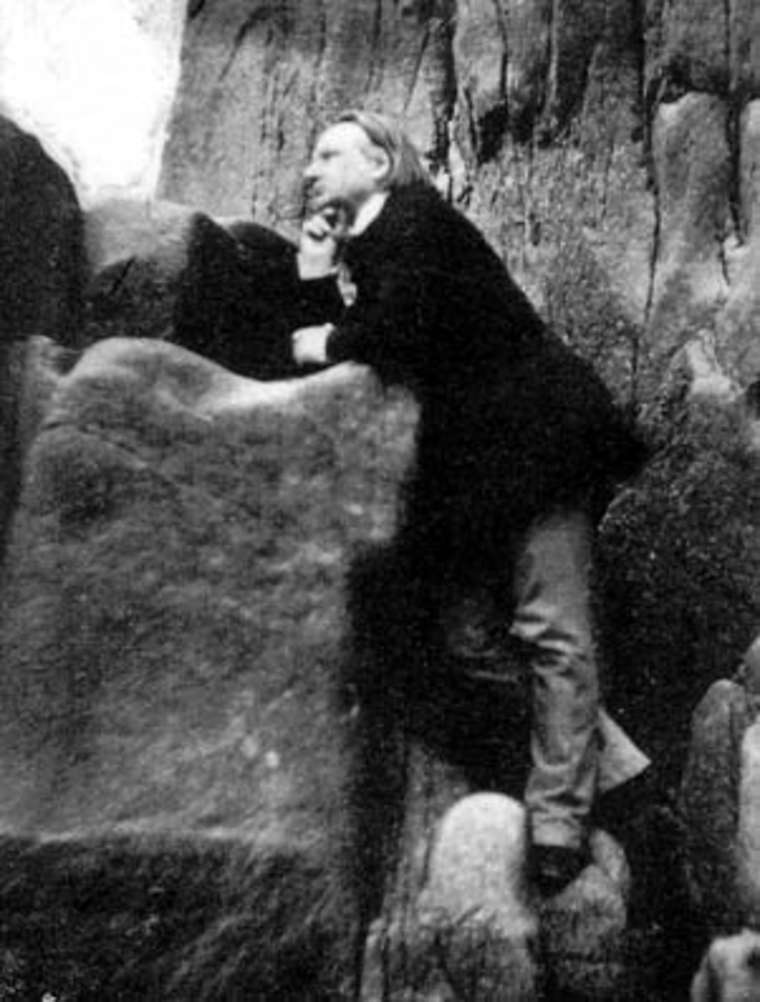 |
Among the Rocks on Jersey (1853-55) |
After three unsuccessful attempts, Hugo was finally elected to the Académie française in 1841, solidifying his position in the world of French arts and letters. A group of French academicians, particularly Étienne de Jouy, were fighting against the "romantic evolution" and had managed to delay Victor Hugo's election. Thereafter, he became increasingly involved in French politics.
He was elevated to the peerage by King Louis-Philippe in 1845 and entered the Higher Chamber as a pair de France, where he spoke against the death penalty and social injustice, and in favour of freedom of the press and self-government for Poland.
In 1848, Hugo was elected to the National Assembly of the Second Republic as a conservative. In 1849, he broke with the conservatives when he gave a noted speech calling for the end of misery and poverty. Other speeches called for universal suffrage and free education for all children. Hugo's advocacy to abolish the death penalty was renowned internationally.
These parliamentary speeches are published in Œuvres complètes: actes et paroles I : avant l'exil, 1841-1851. Scroll down to the Assemblée Constituante 1848 heading and subsequent pages.
When Louis Napoleon (Napoleon III) seized complete power in 1851, establishing an anti-parliamentary constitution, Hugo openly declared him a traitor to France. He relocated to Brussels, then Jersey, from which he was expelled for supporting a Jersey newspaper that had criticised Queen Victoria and finally settled with his family at Hauteville House in Saint Peter Port, Guernsey, where he would live in exile from October 1855 until 1870.
While in exile, Hugo published his famous political pamphlets against Napoleon III, Napoléon le Petit and Histoire d'un crime. The pamphlets were banned in France but nonetheless had a strong impact there. He also composed or published some of his best work during his period in Guernsey, including Les Misérables, and three widely praised collections of poetry (Les Châtiments, 1853; Les Contemplations, 1856; and La Légende des siècles, 1859).
Like most of his contemporaries, Victor Hugo held colonialist views towards Africans. In a speech delivered on 18 May 1879, he declared that the Mediterranean Sea formed a natural divide between " ultimate civilisation and […] utter barbarism," adding "God offers Africa to Europe. Take it," in order to civilise its indigenous inhabitants. This might partly explain why in spite of his deep interest and involvement in political matters he remained strangely silent on the Algerian issue. He knew about the atrocities committed by the French army during the French conquest of Algeria as evidenced by his diary but he never denounced them publicly. A modern reader may also feel puzzled, to say the least, at the meaning of these lines from the conclusion to Le Rhin, chapter 17, published in 1842, twelve years after French troops landed near Algiers.
"What France lacks in Algiers is a little barbarity. The Turks [...] knew how to cut heads better than we do. The first thing that strikes savages is not reason but strength. What France lacks, England has it; Russia too." - Victor Hugo, Le Rhin
However, in Les Misérables, Hugo says the following about the conquering of Algeria [15]:
"Algeria too harshly conquered, and, as in the case of India by the English, with more barbarism than civilization." - Victor Hugo, Les Misérables.
It should also be noted that before being exiled he never denounced slavery, and no trace of its abolition is to be found in the 27 April 1848 entry of his detailed diary.
On the other hand, Victor Hugo fought a lifelong battle for the abolition of the death penalty as a novelist, diarist, and member of Parliament. The Last Day of a Condemned Man published in 1829 analyses the pangs of a man awaiting execution; several entries of Things Seen (Choses vues), the diary he kept between 1830 and 1885, convey his firm condemnation of what he regarded as a barbaric sentence; on 15 September 1848, seven months after the Revolution of 1848, he delivered a speech before the Assembly and concluded, "You have overthrown the throne. […] Now overthrow the scaffold." His influence was credited in the removal of the death penalty from the constitutions of Geneva, Portugal, and Colombia.He had also pleaded for Benito Juárez to spare the recently captured emperor Maximilian I of Mexico but to no avail. His complete archives (published by Pauvert) show also that he wrote a letter asking the United States government, for the sake of their own reputation in the future, to spare John Brown's life, but the letter arrived after Brown was executed.
Although Napoleon III granted an amnesty to all political exiles in 1859, Hugo declined, as it meant he would have to curtail his criticisms of the government. It was only after Napoleon III fell from power and the Third Republic was proclaimed that Hugo finally returned to his homeland in 1870, where he was promptly elected to the National Assembly and the Senate.
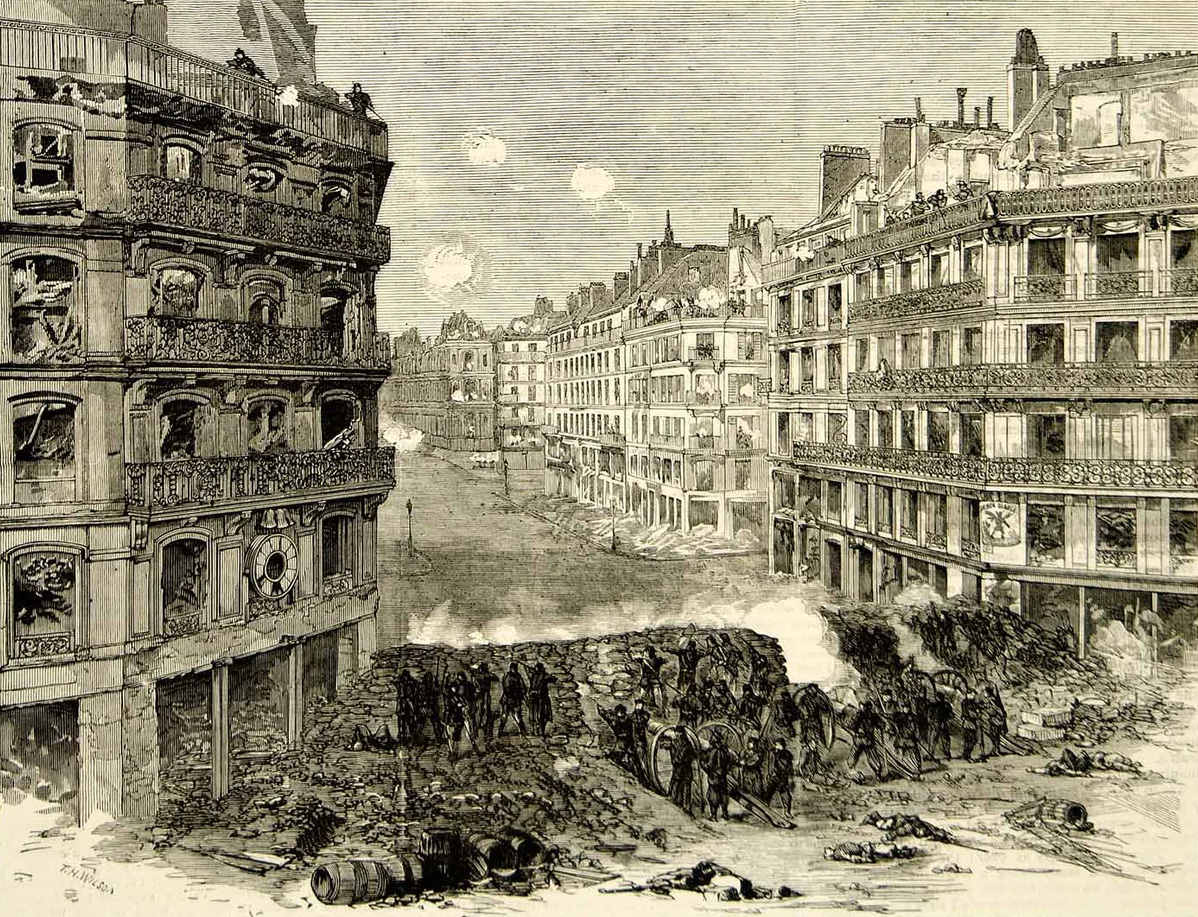 |
Communards defending a barricade on the Rue de Rivoli |
He was in Paris during the siege by the Prussian army in 1870, famously eating animals given to him by the Paris zoo. As the siege continued, and food became ever more scarce, he wrote in his diary that he was reduced to "eating the unknown".
During the Paris Commune - the revolutionary government that took power on 18 March 1871 and was toppled on 28 May - Victor Hugo was harshly critical of the atrocities committed on both sides. On 9 April, he wrote in his diary, "In short, this Commune is as idiotic as the National Assembly is ferocious. From both sides, folly." Yet he made a point of offering his support to members of the Commune subjected to brutal repression. He had been in Brussels since 22 March 1871 when in the 27 May issue of the Belgian newspaper l’Indépendance Victor Hugo denounced the government’s refusal to grant political asylum to the Communards threatened with imprisonment, banishment or execution. This caused so much uproar that in the evening a mob of fifty to sixty men attempted to force their way into the writer’s house shouting " Death to Victor Hugo! Hang him! Death to the scoundrel!"
Victor Hugo, who said, "A war between Europeans is a civil war " was an enthusiastic advocate for the creation of the United States of Europe. He expounded his views on the subject in a speech he delivered during the International Peace Congress which took place in Paris in 1849. On July 14, 1870 he planted the "oak of the United States of Europe" in the garden of Hauteville House where he stayed during his exile on Guernsey from 1856 to 1870.
Because of his concern for the rights of artists and copyright, he was a founding member of the Association Littéraire et Artistique Internationale, which led to the Berne Convention for the Protection of Literary and Artistic Works. However, in Pauvert's published archives, he states strongly that "any work of art has two authors: the people who confusingly feel something, a creator who translates these feelings, and the people again who consecrate his vision of that feeling. When one of the authors dies, the rights should totally be granted back to the other, the people".
Religious views
 |
Marble bust of Victor Hugo by Auguste Rodin |
Hugo's religious views changed radically over the course of his life. In his youth and under the influence of his mother, he identified as a Catholic and professed respect for Church hierarchy and authority. From there he became a non-practicing Catholic and increasingly expressed anti-Catholic and anti-clerical views. He frequented spiritism during his exile (where he participated also in many séances conducted by Madame Delphine de Girardin), and in later years settled into a rationalist deism similar to that espoused by Voltaire. A census-taker asked Hugo in 1872 if he was a Catholic, and he replied, "No. A Freethinker".
After 1872, Hugo never lost his antipathy towards the Catholic Church. He felt the Church was indifferent to the plight of the working class under the oppression of the monarchy. Perhaps he also was upset by the frequency with which his work appeared on the Church's list of banned books. Hugo counted 740 attacks on Les Misérables in the Catholic press. When Hugo's sons Charles and François-Victor died, he insisted that they be buried without a crucifix or priest. In his will, he made the same stipulation about his own death and funeral.
Yet he believed in life after death and prayed every single morning and night, convinced as he wrote in The Man Who Laughs that, " thanksgiving has wings and flies to its right destination. Your prayer knows its way better than you do."
Hugo's rationalism can be found in poems such as Torquemada (1869, about religious fanaticism), The Pope (1878, anti-clerical), Religions and Religion (1880, denying the usefulness of churches) and, published posthumously, The End of Satan and God (1886 and 1891 respectively, in which he represents Christianity as a griffin and rationalism as an angel). Vincent van Gogh ascribed the saying "Religions pass away, but God remains", actually by Jules Michelet, to Hugo.
Victor Hugo and music
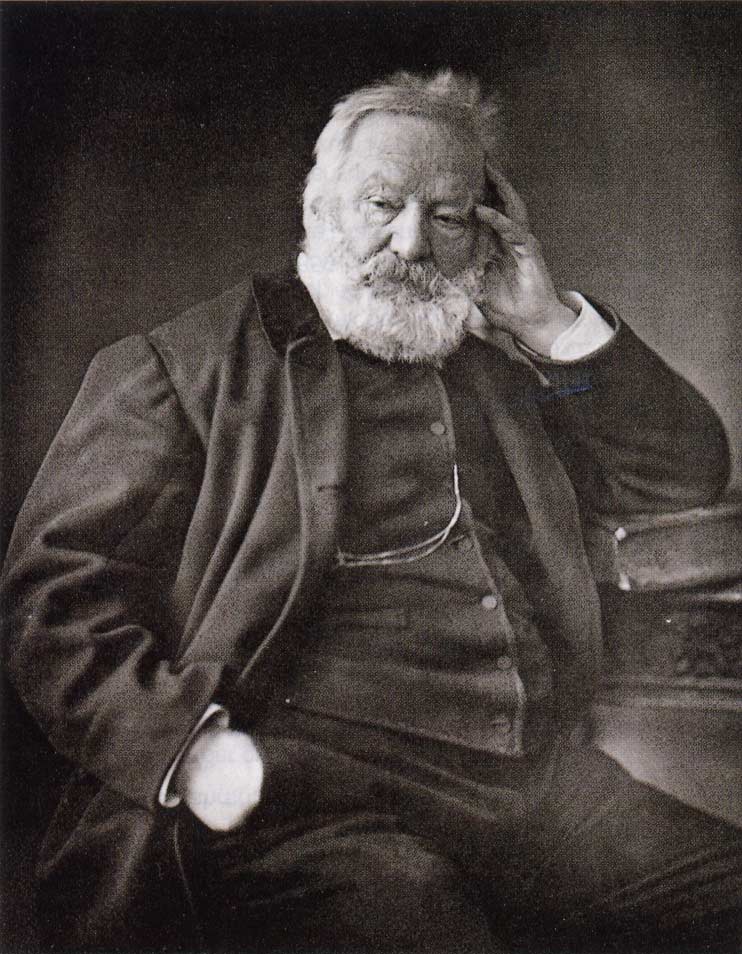 |
Photogravure of Victor Hugo, 1883. |
Although Hugo's many talents did not include exceptional musical ability, he nevertheless had a great impact on the music world through the inspiration that his works provided for composers of the 19th and 20th century. Hugo himself particularly enjoyed the music of Gluck and Weber. In Les Misérables, he calls the huntsman's chorus in Weber's Euryanthe, "perhaps the most beautiful piece of music ever composed". He also greatly admired Beethoven, and rather unusually for his time, he also appreciated works by composers from earlier centuries such as Palestrina and Monteverdi.
Two famous musicians of the 19th century were friends of Hugo: Hector Berlioz and Franz Liszt. The latter played Beethoven in Hugo's home, and Hugo joked in a letter to a friend that, thanks to Liszt's piano lessons, he learned how to play a favourite song on the piano – with only one finger. Hugo also worked with composer Louise Bertin, writing the libretto for her 1836 opera La Esmeralda, which was based on the character in The Hunchback of Notre Dame.Although for various reasons the opera closed soon after its fifth performance and is little known today, it has enjoyed a modern revival, both in a piano/song concert version by Liszt at the Festival international Victor Hugo et Égaux 2007 and in a full orchestral version presented in July 2008 at Le Festival de Radio France et Montpellier Languedoc-Roussillon. On the other hand, he had low esteem for Richard Wagner, whom he described as "a man of talent coupled with imbecility."
Well over one thousand musical compositions have been inspired by Hugo's works from the 19th century until the present day. In particular, Hugo's plays, in which he rejected the rules of classical theatre in favour of romantic drama, attracted the interest of many composers who adapted them into operas. More than one hundred operas are based on Hugo's works and among them are Donizetti's Lucrezia Borgia (1833), Verdi's Rigoletto (1851) and Ernani (1844), and Ponchielli's La Gioconda (1876).
Hugo's novels, as well as his plays, have been a great source of inspiration for musicians, stirring them to create not only opera and ballet but musical theatre such as Notre-Dame de Paris and the ever-popular Les Misérables, London West End's longest running musical. Additionally, Hugo's beautiful poems have attracted an exceptional amount of interest from musicians, and numerous melodies have been based on his poetry by composers such as Berlioz, Bizet, Fauré, Franck, Lalo, Liszt, Massenet, Saint-Saëns, Rachmaninoff, and Wagner.
Today, Hugo's work continues to stimulate musicians to create new compositions. For example, Hugo's novel against capital punishment, The Last Day of a Condemned Man, was adapted into an opera by David Alagna, with a libretto by Frédérico Alagna and premièred by their brother, tenor Roberto Alagna, in 2007. In Guernsey, every two years, the Victor Hugo International Music Festival attracts a wide range of musicians and the premiere of songs specially commissioned from such composers as Guillaume Connesson, Richard Dubugnon, Olivier Kaspar, and Thierry Escaich and based on Hugo's poetry.
Remarkably, not only Hugo's literary production has been the source of inspiration for musical works, but also his political writings have received attention from musicians and have been adapted to music. For instance, in 2009, Italian composer Matteo Sommacal was commissioned by Festival "Bagliori d'autore" and wrote a piece for speaker and chamber ensemble entitled Actes et paroles, with a text elaborated by Chiara Piola Caselli after Victor Hugo's last political speech addressed to the Assemblée législative, "Sur la Revision de la Constitution" (18 July 1851), and premiered in Rome on 19 November 2009, in the auditorium of the Institut français, Centre Saint-Louis, French Embassy to the Holy See, by Piccola Accademia degli Specchi featuring the composer Matthias Kadar.
Declining years and death
 |
| Juliette Droucet |
When Hugo returned to Paris in 1870, the country hailed him as a national hero. He was confident that he would be offered the dictatorship, as shown by the notes he kept at the time. « Dictatorship is a crime. This is a crime I am going to commit » but he felt he had to assume that responsibility. Despite his popularity, Hugo lost his bid for re-election to the National Assembly in 1872.
Throughout his life Hugo kept believing in unstoppable humanistic progress. In his last public address on 3 August 1879 he prophesied in an over-optimistic way, "In the twentieth century war will be dead, the scaffold will be dead, hatred will be dead, frontier boundaries will be dead, dogmas will be dead; man will live."
Within a brief period, he suffered a mild stroke, his daughter Adèle was interned in an insane asylum, and his two sons died. (Adèle's biography inspired the movie The Story of Adele H.) His wife Adèle had died in 1868.
His faithful mistress, Juliette Drouet, died in 1883, only two years before his own death. Despite his personal loss, Hugo remained committed to the cause of political change. On 30 January 1876, he was elected to the newly created Senate. This last phase of his political career was considered a failure. Hugo was a maverick and achieved little in the Senate.
 |
| Hugo on his deathbed, 1885 |
Hugo suffered a mild stroke on 27 June 1878. To honour the fact that he was entering his 80th year, one of the greatest tributes to a living writer was held. The celebrations began on 25 June 1881, when Hugo was presented with a Sèvres vase, the traditional gift for sovereigns. On 27 June, one of the largest parades in French history was held.
Marchers stretched from the Avenue d'Eylau, where the author was living, down the Champs-Élysées, and all the way to the centre of Paris. The paraders marched for six hours past Hugo as he sat at the window at his house. Every inch and detail of the event was for Hugo; the official guides even wore cornflowers as an allusion to Fantine's song in Les Misérables. On 28 June, the city of Paris changed the name of the Avenue d'Eylau to Avenue Victor-Hugo. Letters addressed to the author were from then on labelled "To Mister Victor Hugo, In his avenue, Paris".
Two days before dying, he left a note with these last words: "To love is to act".
On 20 May 1885 le Petit Journal published the official medical bulletin on Hugo’s health condition. "The illustrious patient" was fully conscious and aware that there was no hope for him. They also reported from a reliable source that at one point in the night he had whispered the following alexandrine, " En moi, c’est le combat du jour et de la nuit" - "In me, this is the battle between day and night" . Le Matin published a slightly different version, "Here is the battle between day and night. »
 |
| Catafalque below the Arc de Triomphe in Paris, 1 June 1885 |
Hugo's death from pneumonia on 22 May 1885, at the age of 83, generated intense national mourning. He was not only revered as a towering figure in literature, he was a statesman who shaped the Third Republic and democracy in France. All his life he remained a defender of liberty, equality and fraternity as well as an adamant champion of French culture. In 1877, aged 75, he wrote, "I am not one of these sweet-tempered old men. I am still exasperated and violent. I shout and I feel indignant and I cry. Woe to anyone who harms France! I do declare I will die a fanatic patriot."
Although he had requested a pauper’s funeral he was awarded a state funeral by decree of President Jules Grévy. More than two million people joined his funeral procession in Paris from the Arc de Triomphe to the Panthéon, where he was buried. He shares a crypt within the Panthéon with Alexandre Dumas and Émile Zola. Most large French towns and cities have a street named after him.
 |
Tomb of Victor Hugo at the Panthéon |
Hugo left five sentences as his last will, to be officially published :
Je donne cinquante mille francs aux pauvres. Je veux être enterré dans leur corbillard.
Je refuse l'oraison de toutes les Églises. Je demande une prière à toutes les âmes.
Je crois en Dieu.
"I leave 50,000 francs to the poor. I want to be buried in their hearse.
I refuse [funeral] orations of all churches. I beg a prayer to all souls.
I believe in God."

Victor Hugo (26 tháng 2 năm 1802 tại Besançon - 22 tháng 5 năm 1885 tại Paris) là một nhà văn, nhà thơ, nhà viết kịch thuộc chủ nghĩa lãng mạn nổi tiếng của Pháp. Ông cũng đồng thời là một nhà chính trị, một trí thức dấn thân tiêu biểu của thế kỷ XIX.
Victor Hugo chiếm một vị trí trang trọng trong lịch sử văn học Pháp. Các tác phẩm của ông đa dạng về thể loại và trải rộng trên nhiều lĩnh vực khác nhau. Với tư cách là nhà thơ trữ tình, Hugo đã xuất bản tập Odes et Ballades (1826), Les feuilles d'automne (1831) hay Les Contemplations (1856). Nhưng ông cũng thể hiện vai trò của một nhà thơ dấn thân chống Napoléon III bằng tập thơ Les Châtiments (1853) và vai trò một nhà sử thi với tập La Légende des siècles (1859 và 1877). Thành công vang dội của hai tác phẩm Nhà thờ Đức Bà Paris và Những người khốn khổ đã đưa Victor Hugo trở thành tiểu thuyết gia của công chúng. Về kịch, ông đã trình bày thuyết kịch lãng mạn trong bài tựa của vở kịch Cromwell (1827) và minh họa rõ nét thể loại này ở hai vở kịch nổi tiếng Hernani (1830) và Ruy Blas (1838).
Victor Hugo đã cống hiến lớn lao cho sự đổi mới thơ ca và sân khấu. Ông được người đương thời ngưỡng mộ nhưng cũng gây ra tranh cãi ở một số tác gia hiện đại. Cuộc lưu đày 20 năm trong đế chế thứ hai của ông đặt ra sự suy ngẫm cho nhiều thế hệ về vai trò của một nhà văn trong đời sống chính trị xã hội.
Những lựa chọn mang tính đạo đức và chính trị của Victor Hugo, cùng với những kiệt tác văn học đã đưa ông trở thành gương mặt nổi bật của thời đại đó. Khi qua đời, Victor Hugo được nhà nước cử lễ quốc tang và thi hài ông được đưa vào điện Panthéon.
Tiểu sử
Victor Marie Hugo là con trai út của vị tướng triều đình Joseph Léopold Sigisbert Hugo (1773-1828) với bà Sophie Trébuchet (1772-1821). Hai người anh lớn của ông là Abel Joseph Hugo (1798-1855) và Eugène Hugo (1800-1837). Năm 1811, Victor cùng với anh trai Eugène được gửi trọ học tại trường Collège des Nobles, Madrid. Khoảng năm 1813, ông về Paris sống với mẹ, lúc này đã chia tay cha ông và đi lại với tướng Victor Fanneau de la Horie. Tháng 9 năm 1815, ông vào trọ học tại trường Cordier. Theo Adèle Hugo, đây là khoảng thời gian mà Victor Hugo bắt đầu làm thơ. Ông tự mày mò học vần và luật. Được mẹ và anh trai ủng hộ, Victor đã tỏ rõ tham vọng lớn lao của mình khi ông viết trong nhật ký lúc mới 14 tuổi: "Tôi muốn trở thành Chateaubriand hoặc không gì cả!".
Tập thơ Odes ra mắt năm 1821 khi ông 19 tuổi, với 1500 ấn bản được tiêu thụ trong vòng 4 tháng. Vua Louis XVIII sau khi chiêm ngưỡng tác phẩm này, đã dành tặng ông một học bổng trị giá một nghìn franc một năm.
Sau khi mẹ ông mất (1821), Victor Hugo làm đám cưới với người bạn gái thời thơ ấu Adèle Foucher. Họ sinh được năm người con:
Léopold (1823-1823)
Léopoldine (1824-1843)
Charles(1826-1871)
François-Victor (1828-1873)
Adèle (1830-1915)
Victor Hugo có rất nhiều tình nhân, nổi bật trong số đó là mối quan hệ nồng cháy với Juliette Drouet (Julienne Gauvain). Họ gặp nhau lần đầu tiên năm 1833, năm Victor Hugo ra mắt vở kịch Lucrèce Borgia. Juliette vào vai công chúa Négroni, một vai diễn bé nhỏ nhưng để lại ấn tượng mạnh cho khán giả và nhất là cho Victor Hugo. Họ bắt đầu đi lại với nhau. Juliette trở thành nguồn cảm hứng bất tận cho Victor. Juliette luôn dành cho ông một tình yêu mãnh liệt, một sự chiếm hữu lớn, một tính cách thất thường.
7 tháng 2 năm 1841, Victor Hugo được bầu vào Viện Hàn Lâm Pháp, sau bốn lần thất bại.
Mùa hè năm 1843, ông cùng Juliette đi nghỉ. Tại một quán cà phê ở Rochefort, ông tình cờ nhận được tin dữ thông qua một bài báo: Léopoldine-con gái ông và chồng bị chết đuối trên sông Seine ở vùng Villequier. Sự kiện này đã chấn động dữ dội Victor Hugo.
Năm 1845, Hugo bắt đầu đi vào chính trị. Năm 1848, ông được bầu làm nghị sĩ hội đồng lập hiến. Ông lên án cuộc đảo chính ngày 2 tháng 12 năm 1851 của hoàng tử Louis-Napoléon (cháu của Napoléon Bonaparte). Ngay lập tức, Victor Hugo bị buộc đi đày ở Bỉ, sau đó là đảo Jersey và Guernesey.
Trong khoảng thời gian sống lưu vong, Hugo vẫn không ngừng sáng tác. Ông cho ra đời các tập thơ: les Châtiments (1853), les Contemplations (1856) và hoàn thành tiểu thuyết les Misérables (1862) - tác phẩm được công chúng đón nhận nồng nhiệt.
Sau khi nền cộng hòa Pháp được thiết lập năm 1870, Victor Hugo trở về Paris.
Ngày 8 tháng 2 năm 1871, ông được bầu vào quốc hội Pháp.
Năm 1876, ông được bầu làm thượng nghị sĩ. Những tham luận đầu tiên của ông hướng đến sự ân xá cho các chiến sĩ công xã Paris.
Ngày 22 tháng 5 năm 1885, Victor Hugo qua đời vì sung huyết phổi. Hai triệu người dân đã đưa tiễn ông đến điện Panthéon.
Tác phẩm
Kịch
Cromwell (1827)
Hernani (1830)
Marion Delorme (1831)
Le Roi s'amuse (1832)
Lucrèce Borgia (1833)
Marie Tudor (1833)
Angelo, tyran de Padoue (1835)
Ruy Blas (1838)
Les Burgraves (1843)
Torquemada (1882)
Théâtre en liberté (1886)
Tiểu thuyết
Bug-Jargal (1820)
Han d'Islande (1823)
Le Dernier Jour d'un condamné (1829)
Nhà thờ Đức Bà Paris (Notre-Dame de Paris) (1831)
Claude Gueux (1834)
Những người khốn khổ (Les Misérables) (1862)
Les Travailleurs de la mer (1866)
Người cười (L'Homme qui rit) (1869)
Chín mươi ba (Quatre-vingt-treize) (1874)

Thơ
Odes et poésies diverses (1822)
Nouvelles Odes (1824)
Odes et Ballades (1826)
Les Orientales (1829)
Les Feuilles d’automne (1831)
Les Chants du crépuscule (1835)
Les Voix intérieures (1837)
Les Rayons et les ombres (1840)
Les Châtiments (1853)
Les Contemplations (1856)
Première série de la Légende des Siècles (1859)
Les Chansons des rues et des bois (1865)
L'Année terrible (1872)
L'Art d'être grand-père (1877)
Nouvelle série de la Légende des Siècles (1877)
Religions et religion (1880)
Les Quatre Vents de l'esprit (1881)
Série complémentaire de la Légende des Siècles (1883)
La Fin de Satan (1886)
Toute la Lyre (1888)
Dieu (1891)
Toute la Lyre - nouvelle série (1893)
Les Années funestes (1898)
Dernière Gerbe (1902)
Océan. Tas de pierres (1942)

Mặt Trời Lặn (1853–1855)
Tác phẩm khác
Étude sur Mirabeau (1834)
Littérature et philosophie mêlées (1834)
Le Rhin (1842)
Napoléon le Petit (pamphlet, 1852)
Lettres à Louis Bonaparte (1855)
William Shakespeare (1864)
Paris-Guide (1867)
Mes Fils (1874)
Actes et paroles - Avant l'exil (1875)
Actes et paroles - Pendant l'exil (1875)
Actes et paroles - Depuis l'exil (1876)
Histoire d'un crime - 1re partie (1877)
Histoire d'un crime - 2e partie (1878)
Le Pape (1878)
L'Âne (1880)
L'Archipel de la Manche (1883)
Œuvres posthumes
Choses vues - 1re série (1887)
Alpes et Pyrénées (1890)
France et Belgique (1892)
Correspondances - Tome I (1896)
Correspondances - Tome II (1898)
Choses vues - 2e série (1900)
Post-scriptum de ma vie (1901)
Mille Francs de récompense (1934)
Pierres (1951)
Mélancholia
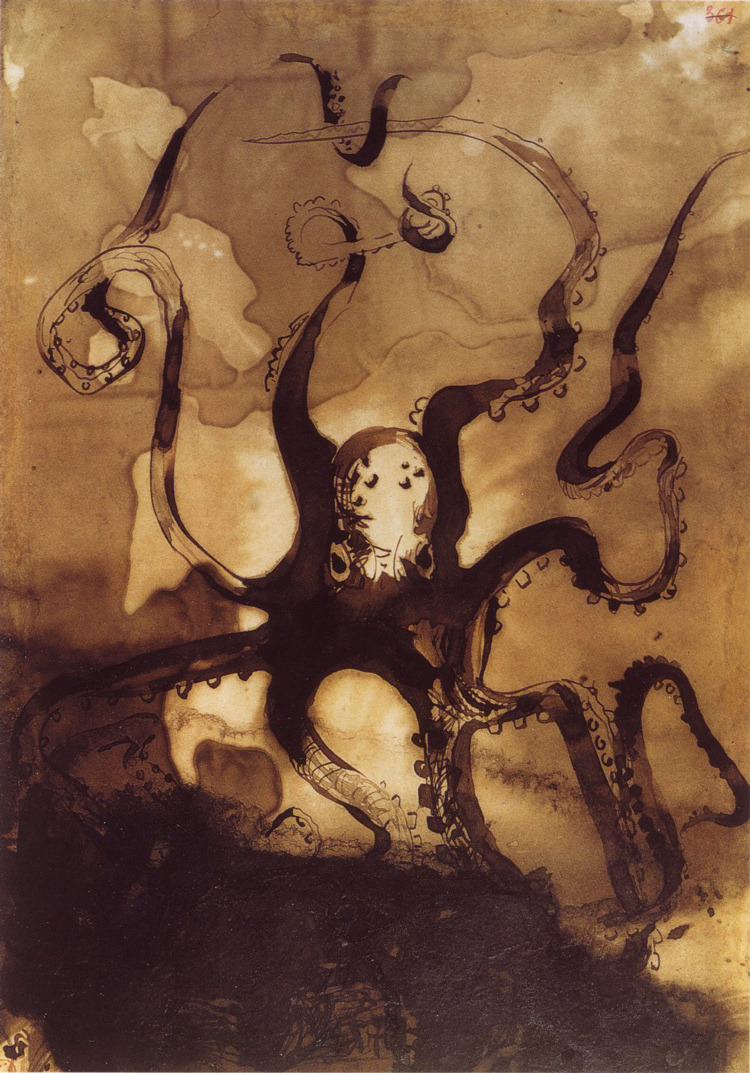 |
| Bạch tuộc và những cái xúc tu (1866) |
No comments:
Post a Comment